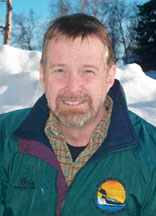 |

Friday Evening Lecture Series
 |
|
|
|
07/01/05
Overwintering in the Arctic: Animal Strategies for Surviving the Long, Cold, and Dark
Brian M. Barnes, University of Alaska
Introduction by John Hobbie, Marine Biological Laboratory
Lecture Abstract:
In Alaska, winters begin early, last seemingly forever, and are very cold, snowy, and dark. This talk will review the physiological and behavioral strategies available to animals for surviving and coping with arctic winters, including freeze tolerance in frogs, supercooling in insects, and hibernation in ground squirrels and bears. Using data logging and advanced telemetry, the locations, behavior, sleep, circadian rhythms, cardiovascular patterns, and thermoregulation of animals are recorded as they overwinter under natural conditions. Little is known about the genetic and molecular basis of hibernation, but discovering its mechanisms could lead to novel clinical therapies and escape strategies in humans.
Brian Barnes is the Director of the Institute of Arctic Biology and Professor of Zoophysiology at the University of Alaska Fairbanks, where he teaches courses in reproductive biology and physiology. Dr. Barnes is also the Science Director of the Toolik Field Station, and he has served as the Research Focus Leader for the National Science Foundation’s Experimental Program to Stimulate Competitive Research (EPSCoR) in Integrative Approaches to Environmental Physiology from 2000 to 2004. He received his Ph.D. in Zoology from the University of Washington in 1983 and was a post-doctoral fellow in the Departments of Zoology and Psychology at the University of California from 1983 to 1986. Dr. Barnes was also a Visiting Scholar at Norway’s University of Tromsø in 1995 and a Visiting Professor at the University of Groningen in the Netherlands in 1996. He is a member of the Board of Editors of the University of Alaska Press, Sigma Xi, the American Association for the Advancement of Science, the American Society of Mammalogists, and the American Society of Physiology, among other organizations.
The Ecosystems Center's co-director John Hobbie will introduce Dr. Barnes. Dr. Hobbie joined the MBL in 1976 and serves as Senior Scientist and Co-Director of The Ecosystems Center. The MBL recently named Dr. Hobbie a Distinguished Scientist for his outstanding achievements and service to the laboratory. Dr. Hobbie's degrees are in Zoology—an A.B. from Dartmouth College, an M.A. from the University of California, Berkeley, and a Ph.D. from Indiana University. As an aquatic ecologist, Dr. Hobbie’s research has attempted to identify the factors controlling decompostition and productivity within aquatic ecosystems. His current research interests center on the role of microbes in freshwater, estuarine, and soil ecosystems. Field sites for this work are located at the Plum Island estuary on Massachusetts’ north shore and the Toolik Lake Field Station on the north slope of Alaska. Both are part of the National Science Foundation’s 24 sites across North America and Antartica designated as Long-Term Ecological Research (LTER) Programs. Dr. Hobbie helped establish the Arctic Long Term Ecological Research LTER site and is the director of the Arctic LTER project which focuses on the ecology of tundra, streams, and lakes at Toolik Lake.
|